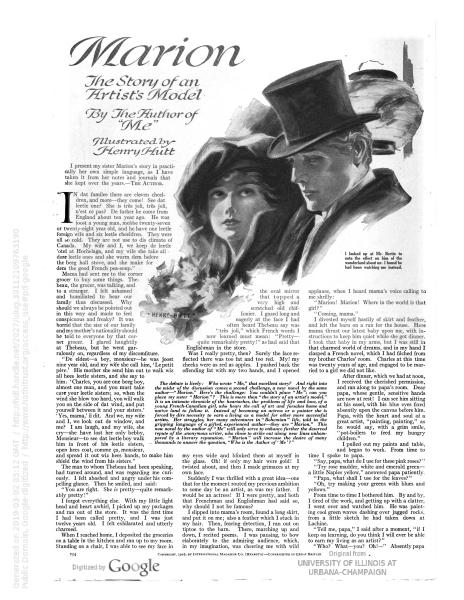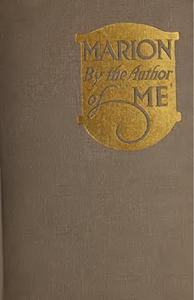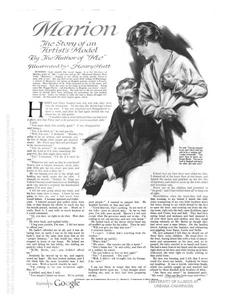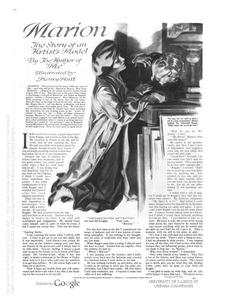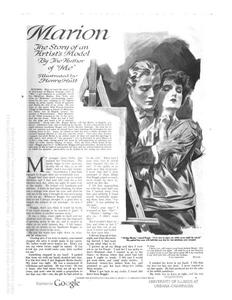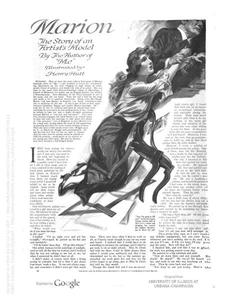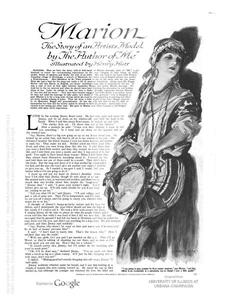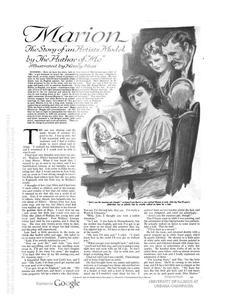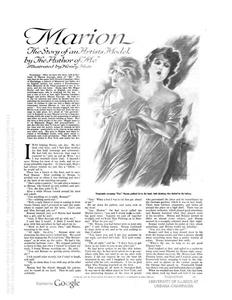The debate is lively: Who wrote “Me,” that excellent story? And right into
the midst of the discussion comes a second challenge, a new novel by the same
author—“Marion.” Here’s the challenge: You couldn’t place “Me”; can
you place my sister “Marion”? This is more than “the story of an artist’s
model.” It is an intimate chronicle of the heartaches, the problems of life
and love, of a young French-Canadian girl, who hears the call of art and forsakes
home and native land to follow it. Instead of becoming an actress or a painter she
is forced by dire necessity to earn a living as a model for other more successful
artists. Her struggles, her many adventures in “Bohemian” life, told in the
gripping language of a gifted, experienced author—they are “Marion.” This new
novel by the author of “Me” will only serve to enhance further the deserved
repute of the anonymous writer, who chose to strike out along new lines unhampered
by a literary reputation. “Marion” will increase the desire of many thousands
to answer the question, “Who is the Author of ‘Me’?”
I present my sister Marion’s story in practically her own simple language, as I
have taken it from her notes and journals that she kept over the years.—The
Author.
“In dat familee there are eleven cheeldren, and more—they come! See dat leetle
one? She is très joli, très joli, n’est ce pas? De father he come from England
about ten year ago. He was joost a young man, mebbe twenty-seven or
twenty-eight year old, and he have one leetle foreign wife and six leetle
cheeldren. They were all so cold. They are not use to dis climate of Canada. My
wife and I, we keep de leetle ‘otel at Hochelaga, and my wife she take all dose
leetle ones and she warm dem before the beeg hall stove, and she make for dem
the good French pea-soup.”
Mama had sent me to the corner grocer to buy some things. Thebeau, the grocer, was
talking, and to a stranger. I felt ashamed and humiliated to hear our family thus
discussed. Why should we always be pointed out in this way and made to feel
conspicuous and freaky? It was horrid that the size of our family and my mother’s
nationality should be told to everyone by that corner grocer. I glared haughtily
at Thebeau, but he went garrulously on, regardless of my discomfiture.
“De eldest—a boy, monsieur, he was joost nine year old, and my wife she call
him, ‘Le petit père.’ His mother she send him out to walk wiz all hees leetle
sisters, and she say to him: ‘Charles, you are one beeg boy, almost one man,
and you must take care your leetle sisters; so, when the wind she blow too
hard, you will walk you on the side of dat wind, and put yourself between it
and your sisters.’”
“‘Yes, mama,’ il dit. And we, my wife and I, we
look out de window, and me? I am laugh, and my wife, she cry—she have lost her
only bebby, Monsieur—to see dat leetle boy
walk him in front of his leetle sisters, open hees coat, comme ça, monsieur, and spread
it out wiz hees hands, to make him shield the wind from his sisters.”
The man to whom Thebeau had been speaking, had turned around, and was regarding me
curiously. I felt abashed and angry under his compelling glance. Then he smiled,
and said:
“You are right. She is pretty—quite remarkably pretty!”
I forgot everything else. With my little light head and heart awhirl, I picked up
my packages and ran out of the store. It was the first time I had been called
pretty, and I was just twelve years old. I felt exhilarated and utterly
charmed.
When I reached home, I deposited the groceries on a table in the kitchen and ran
up to my room. Standing on a chair, I was able to see my face in the oval mirror
that topped a very high and scratched old chiffonier. I gazed long and eagerly at the face I had often heard
Thebeau say was “très joli,” which French
words I now learned must mean: “Pretty—quite remarkably pretty!” as had said
that Englishman in the store.
Was I really pretty, then? Surely the face reflected there was too fat and too
red. My! my cheeks were as red as apples. I pushed back the offending fat with my
two hands, and I opened my eyes wide and blinked them at myself in the glass. Oh!
if only my hair were gold! I twisted about, and then I made grimaces at my own
face.
Suddenly I was thrilled with a great idea—one that for the moment routed my
previous ambition to some day be an artist, as was my father. I would be an
actress! If I were pretty, and both that Frenchman and Englishman had said so, why
should I not be famous?
I slipped into mama’s room, found a long skirt, and put it on me; also a feather
which I stuck in my hair. Then, fearing detection, I ran out on tiptoe to the
barn. There, marching up and down, I recited poems. I was pausing, to bow
elaborately to the admiring audience, which, in my imagination, was cheering me
with wild applause, when I heard mama’s voice calling to me shrilly:
“Marion! Marion! Where in the world is that girl?”
“Coming, mama.”
I divested myself hastily of skirt and feather, and left the barn on a run for the
house. Here mama thrust our latest baby upon me, with instructions to keep him
quiet while she got dinner. I took that baby in my arms, but I was still in that
charmed world of dreams, and in my hand I clasped a French novel, which I had
filched from my brother Charles’ room. Charles at this time was twenty years of
age, and engaged to be married to a girl we did not like.
After dinner, which we had at noon, I received the cherished permission, and ran
along to papa’s room. Dear papa, whose gentle, sensitive hands are now at rest! I
can see him sitting at his easel, with his blue eyes fixed absently upon the
canvas before him. Papa, with the heart and soul of a great artist, “painting,
painting,” as he would say, with a grim smile, “pot-boilers to feed my
hungry children.”
I pulled out my paints and table, and began to work. From time to time I spoke to
papa.
“Say, papa, what do I use for these pink roses?”
“Try rose madder, white and emerald green—a little Naples yellow,” answered
papa patiently.
“Papa, what shall I use for the leaves?”
“Oh, try making your greens with blues and yellows.”
From time to time I bothered him. By and by, I tired of the work, and getting up
with a clatter, I went over and watched him. He was painting cool green waves
dashing over jagged rocks, from a little sketch he had taken down at Lachine.
“Tell me, papa,” I said after a moment, “if I keep on learning, do you
think I will ever be able to earn my living as an artist?”
“Who? What—you? Oh!—” Absently papa
255blew the smoke about his
head, gazed at me, but did not seem to see me. He seemed to be talking rather to
himself, not bitterly, but just sadly:
“Better be a dressmaker, or a plumber, or
a butcher, or a policeman. There is no money in art!”
Next to our garden, separated only by a wooden fence, through which we children
used to peep, was the opulent and well-kept garden of Monsieur Prefontaine, who was a very important man, once Mayor of
Hochelaga, the French quarter of Montreal, in which we lived. Madame Prefontaine,
moreover, was an object of unfailing interest and absorbing wonder to us children.
She was an enormously fat woman, and had once taken a trip to New York City, to
look for a wayward sister. There she had been offered a job as fat woman for a big
circus, Madame Prefontaine used to say to the neighbors, who always listened to
her with great respect:
“Mon Dieu! That New York—it is one beeg hell!
Never do I feel so hot as in dat terreeble city! I feel de grease it run all
out of me! Mebbe, eef I stay at dat New York, I may be one beeg
meelionaire—Oui! But, non! Me? I prefer my leetle home, so cool and quiet,
in Hochelaga than be meelionaire in dat New York, dat is like
purgatory.”
We had an old, straggly garden. Everything about it looked “seedy” and
uncared for and wild, for we could not afford a gardener. My sisters and I found
small consolation in papa’s stout assertion that it looked picturesque, with its
gnarled old apple-trees and shrubs in their natural wild state. I was sensitive
about that garden. It was awfully poor looking, in comparison with our neighbors’
nicely kept places. It was just like our family, I sometimes treacherously
thought—unkempt and wild and “heathenish.” A neighbor once called us that. I
stuck out my tongue at her when she said it. Being just next to the fine garden of
Monsieur Prefontaine, it appeared the more
ragged and beggarly, that garden of ours.
Mama would send us children to pick the maggots off the currant bushes and the
bugs off the potato plants and, to encourage us, she would give us one cent for
every pint of bugs or maggots we showed her. I hated the bugs and maggots, but it
was fascinating to dig up the potatoes. To see the vegetables actually under the
earth seemed almost like a miracle, and I would pretend the gnomes and fairies put
them there, and hid inside the potatoes. I once told this to my little brothers
and sisters, and Nora, who was just a little tot, wouldn’t eat a potato again for
weeks, for fear she might bite on a fairy. Most of all, I loved to pick
strawberries, and it was a matter of real grief and humiliation to me that our own
strawberries were so dried-up looking and small, as compared with the big,
luscious berries I knew were in the garden of Monsieur Prefontaine.
On that day I had been picking strawberries for some time, and the sun was hot and
my basket only half full. I kept thinking of the berries in the garden adjoining,
and the more I thought of them, the more I wished I had some of them.
It was very quiet in our garden. Not a sound was anywhere, except the breezes,
making all kinds of mysterious whispers among the leaves. For some time my eye had
become fixed, fascinated, upon a loose board, with a hole in it near the ground. I
looked and looked at that hole, I thought to myself: “It is just about big
enough for me to crawl through.” Hardly had that thought occurred to me,
when down on hands and knees I dropped, and into the garden of the great Monsieur
Prefontaine I crawled.
The strawberry beds were right by the fence. Greedily I fell upon them. Oh, the
exquisite joy of eating forbidden fruit! The fearful thrills that even as I ate
ran up and down my spine, as I glanced about me on all sides. There was even a
wicked feeling of fierce joy in acknowledging to myself that I was a thief.
“Thou shalt not steal!” I repeated the commandment that I had broken even
while my mouth was full, and then, all of a sudden, I heard a voice, one that had
inspired me always with feelings of respect, and awe, and fear.
“How you get in here?”
Monsieur Prefontaine was towering sternly above
me. He was a big man, bearded, and with a face of preternatural importance and
sternness.
I got up. My legs were shaky, and the world was whirling about me. I thought of
the jail, where thieves were taken, and a great terror seized me. Monsieur Prefontaine had been the Mayor of Hochelaga.
He could have put me in prison for all the rest of my life. We would all be
disgraced.
“Well? Well? How you get in here?” demanded Monsieur Prefontaine.
“M’sieu? I—I—crawled in!” I stammered, indicating the hole in
the fence.
“Bien! Crawl out, madame!”
“Madame” to me, who was but twelve years
old!
“CRAWL OUT!” commanded Monsieur, pointing to
the hole, and feeling like a worm, ignominiously, under the awful eye of that
ex-Mayor of Hochelaga, on hands and knees and stomach, I crawled out.
Once on our side, I felt not the shame of being a thief so much, as the
degradation of crawling out with that man looking.
Feeling like a desperate criminal, I swaggered up to the house, swinging my
half-filled basket of strawberries. As I came up the path, Ellen, a sister just
two years older than I, put her head out of an upper window and called down to
me:
“Marion, there’s a beggar boy coming in at the 256 gate. Give him some
of that stale bread mama left on the kitchen table to make a pudding
with.”
The boy was about thirteen, and he was a very dirty boy, with hardly any clothes
on him. As I looked at him, I was thrilled with a most beautiful inspiration. I
could regenerate myself by doing an act of lovely charity.
“Wait a minute, boy.”
Disregarding the stale bread, I cut a big generous slice of fresh, sweet smelling
bread that Sung Sung, our one very old Chinese servant, had made that day. Heaping
it thick with brown sugar, I handed it to the boy.
“There, beggar boy,” I said generously, “you can eat it all.”
He took it with both hands, greedily, and now as I looked at him another fiendish
impulse seized me. Big boys had often hit me, and although I fought back as
valiantly and savagely as my puny fists would let me, I had always been worsted,
and had been made to realize the weakness of my sex and age. Now as I looked at
that beggar boy, I realized that here was my chance to hit a big boy. He was
smiling at me gratefully across that slice of sugared bread, and I leaned over and
suddenly pinched him hard on each of his cheeks. His eyes bulged with amazement,
and I still remember his expression of surprise and pained fear. I made a horrible
grimace at him and then ran out of the room.
There was a long, black period when we knew acutely the meaning of what papa
wearily termed “Hard Times.” Even in “Good Times” there are few people
who buy paintings, and no one wants them in “Hard Times.” A terrible epidemic
of smallpox broke out in the city. The French and not the English Canadians were
the ones chiefly afflicted, and my father set this down to the fact that the
French resisted vaccination. In fact, there were anti-vaccination riots all over
the French quarter, where we lived.
And now my father, in this desperate crisis, proved the truth of the old adage
that “Blood will tell.” Ours was the only house on our block, or for that
matter the surrounding streets, where the hideous yellow sign “PICOTTE” (small pox) was not conspicuously nailed
upon the front door, and this despite the fact that we were a large family of
children. Papa hung sheets all over the house, completely saturated with
disinfectants. Every one of us children were vaccinated, and were not allowed to
leave the premises. Papa himself went upon all the messages, even doing the
marketing.
He was not absentminded in those days, nor in the gruelling days of dire poverty
that followed the plague. Child as I was, I vividly recall the terrors of that
period, going to bed hungry, my mother crying in the night and my father walking
up and down, up and down. Sometimes it seemed to me as if papa walked up and down
all night long.
My brother Charles, who had been for some time our main support, had married (the
girl we did not like), and although he fervently promised to continue to
contribute to the family’s support, his wife took precious care that the
contribution should be of the smallest, and she kept my brother, as much as she
could, from coming to see us.
A day came when, with my mother and it seemed all of my brothers and sisters, I
stood on a wharf waving to papa on a great ship. There he stood, by the railing,
looking so young and good. Papa was going to England to try to induce
grandpapa—that grandfather we had never seen—to help us. We clung about mama’s
skirts—poor little mama, who was half distraught—and we all kept waving to papa,
with our hats and hands and handkerchiefs, and calling out:
“Good-by, papa! Come back! Come back soon!” until the boat was only a dim,
shadowy outline.
The dreadful thought came to me that perhaps we would never see papa again!
Suppose his people, who were rich and grand, should induce our father never to
return to us !
I had kept back my tears. Mama had told us that none of us must let papa see us
cry, as it might “unman” him, and she herself had heroically set the example
of restraining her grief until after his departure. Now, however, the strain was
loosened. I fancied I read in my brothers’ and sisters’ faces—we were all
imaginative and sensitive and excitable—my own fears. Simultaneously we all began
to cry.
Never will I forget that return home, all of us children crying and sobbing, and
mama now weeping as unconcealedly as any of us, and the French people stopping us
on the way to console or commiserate with us; but although they repeated over and
over, “Pauvres petits enfants! Pauvre petite mère!” I saw their significant
glances, and I knew that in their minds was the same treacherous thought of my
father.
But papa did return! He could have stayed in England, and, as my sister Ada
extravagantly put it, “lived in the lap of luxury,” but he came back to his
noisy, ragged little “heathens,” and the “painting, painting of pot-boilers
to feed my hungry children.”
“Monsieur de St. Vidal is ringing the
door-bell,” called Ellen. “Why don’t you open the door, Marion. I believe
he has a birthday present for you in his hand.”
It was my sixteenth birthday, and Monsieur de St.
Vidal was my first beau! He was a relative of our neighbors, the Prefontaines, and
I liked him pretty well. I think I chiefly liked to be taken about in his stylish
little dog-cart. I felt sure all the other girls envied me.
“You go, Ellen, while I change my dress.”
I was anxious to appear at my best before St. Vidal. It was very exciting, this
having a beau. I would have enjoyed it much more, however, but for the interfering
inquisitiveness of my sisters, Ada and Ellen, who never failed to ask me each time
I had been out with him, whether he had “proposed” yet or not.
Ellen was running up the stairs, and now she burst into our room excitedly, with a
package in her hand.
“Look, Marion! Here’s your present. He wouldn’t stop—just left it, and he said,
with a Frenchy bow—Whew! I don’t like the French!—‘Pour
Mamselle Marion, avec mes compliments!’” and Ellen mimicked St.
Vidal’s best French manner and voice.
I opened the package. Oh, such a lovely box of paints—a perfect treasure!
“Just exactly what I wanted!” I cried excitedly, looking at the little tubes,
all shiny and clean, and the new brushes and palette.
Ada was sitting reading by the window, and now she looked up and said:
“Oh, did that French wine merchant give that to Marion?”
She cast a disparaging glance at the box, and then, addressing Ellen, she
continued:
“Marion is disgustingly old for sixteen, but, of course, if he gives her
presents—” (he had never given me anything but candy before)
“he will propose to her, I suppose. Mama married at sixteen, and I suppose
some people—” Ada gave me another look that was anything but
approving—“are in a hurry to get married. I
shall never marry till I am twenty-five!” Ada was twenty.
This time, Ellen, who was eighteen, got the condemning look. Ellen was engaged to
be married to an American editor, who wrote to her every day in the week and
sometimes telegraphed. They were awfully in love with each other. Ellen said
now:
“Oh, he’ll propose all right. Wallace came around a whole lot, you know, before
he actually popped.”
“Well, maybe so,” said Ada, “but I think we ought to know that French wine
merchant’s intention pretty soon. I’ll ask him if you like,” she
volunteered.
“No, no, don’t you dare!” I protested.
257
“Well,” said Ada, “if he doesn’t propose to you soon, you ought to stop
going out with him. It’s bad form.”
That evening St. Vidal called and took me to the rink, and I enjoyed myself
hugely. He was a graceful skater, and so was I, and I felt sure that everyone’s
eye was upon me. I was very proud of my “beau,” and I secretly wished that he
was blond. I did prefer the English type. However, conscious of what was expected
of me by my sisters, I smiled my sweetest on St. Vidal, and by the time we started
for home I realized, with a thrill of anticipation, that he was in an especially
tender mood. He helped me along the street carefully and gallantly.
It was a clear, frosty night, and the snow was piled up as high as our heads on
each side of the sidewalks. Suddenly St. Vidal stopped, and drawing my hand
through his arm, he began, with his walking stick, to write upon the snow:
“Madame Marion de St. Vida—”
Before he got to the “l” I was seized with panic. I jerked my hand from his
arm, took to my heels and ran all the way home.
Now it had come—that proposal, and I did not want it. It filled me with
embarrassment and fright. When I got home, I burst into Ada’s room and gasped:
“It’s done! He did propose! B-but I said—I said—” I hadn’t said anything at
all.
“Well?” demanded Ada.
“Why, I’m not going to, that’s all,” I said.
Ada returned to the plaiting of her hair. Then she said skeptically:
“H’m, that’s very queer. Are you sure he proposed, because
I heard he was all the time engaged to a girl in Côte des
Neiges.”
“Oh, Ada,” I cried, “do you suppose he’s a bigamist? I think I’m fortunate
to have escaped from his snare!”
The next day Madame Prefontaine told mama that
St. Vidal had said he couldn’t imagine what in the world I had run away suddenly
from him like that for, and he said:
“Maybe she had a stomach-ache.”
“Ellen, don’t you wish something would happen?”
Ellen and I were walking up and down the street near the English church.
“Life is so very dull and monotonous,” I went on. “My! I would be glad if
something real bad happened—some sort of tragedy. Even that is better than this
deadness.”
Ellen looked at me, and seemed to hesitate.
“Yes, it’s awful to be so poor as we are,” she answered, “but what I would
like is not so much money as fame, and, of course, love. That usually goes with
fame.”
Ellen’s fiancé was going to be famous some day. He was in New York, and had
written a wonderful play. As soon as it was accepted, he and Ellen were to be
married.
“Well, I tell you what I’d like above everything else on earth,” I said
sweepingly. “I would love to be a great actress, and break everybody’s hearts.
It must be perfectly thrilling to be notorious, and we certainly are miserable
girls.”
We were chewing away with great relish the contents of a bag of candy.
“Anyhow,” said Ellen, “you seem to be enjoying that candy,” and we both
giggled.
Two men were coming out of the side door of the church. Attracted by our laughter,
they came over directly to us. One of them we knew well. He was Jimmy McAlpin, the
son of a fine old, very rich, Scotch lady, who had always taken an interest in our
family, and especially mama. Jimmy, though he took up the collection in church,
had been, so heard the neighbors whisper to mama, once very dissipated. He had
known us since we were little girls, and always teased us a lot. He would come up
behind me on the street and pull my long plait of hair, saying: “Pull the
string, gentlemen and ladies, and the figure moves!”
Now he came smilingly up to us, followed by his friend, a big stout man, with a
military carriage and gray moustache. I recognized him, too, though we did not
know him. He was a very rich and important citizen of our Montreal. Of him also I
had heard bad things. People said he was “fast.” That was a word they always
whispered in Montreal, and shook their heads over, but whenever I heard it, its
very mystery and badness thrilled me somehow. Ada said there was a depraved and
low streak in me, and I guiltily admitted to myself that she was right.
“What are you girls laughing about?” asked Jimmy, a question that merely
brought forth a fresh accession of giggles.
Colonel Stevens was staring at me, and he had thrust his right eye into a shining
monocle. I thought him very grand and distinguished looking, much superior to St.
Vidal. Anyway we were tired of the French, having them on all sides of us, and as
I have said, I admired the blond type of men. Colonel Stevens was not exactly
blond, for his hair was gray (he was bald on top, though his hat covered that),
but he was typically British, and somehow the Englishmen always appeared to me
much superior to our little French Canucks, as we called them.
Said the colonel, pulling at his moustache: “A laughing young girl in a
pink-cotton frock is the sweetest thing on earth.”
I had on a pink-cotton frock, and I was laughing. I thought of what I had heard
Madame Prefontaine say to mama—in a whisper: “He is one dangerous man—dat
Colonel Stevens, and any woman seen wiz him will lose her reputation.”
“Will I lose mind?” I asked myself. I must say my heart beat, fascinated,
with the idea. Something, now, was really happening, and I was excited and
delighted.
“Can’t we take the ladies”—I nudged Ellen—“some place for a little
refreshment,” said the colonel.
“No,” said Ellen, “mama expects us home.”
“Too bad,” murmured the colonel, very much disappointed, “but how about
some other night? To-morrow, shall we say?”
Looking at me, he added: “May I send you some roses, just the color of your
cheeks?”
I nodded from behind Ellen’s back.
“Come on,” said Ellen brusquely, “we’d better be getting home. You know
you’ve got the dishes to do, Marion.”
She drew me along. I couldn’t resist looking back, and there was that fascinating
colonel, standing stock still in the street, still pulling
304 at his
moustache, and staring after me. He smiled all over, when I turned, and blew me an
odd little kiss, like a kind of salute, only from his lips.
That night, when Ellen and I were getting ready for bed, I said: “Isn’t the
colonel thrillingly handsome, though?”
“Ugh! I should say not,” said Ellen. “Besides, he’s a married man, and a
flirt.”
“Well, I guess he doesn’t love his old wife,” said I.
“If she is old,” said Ellen, “so is he—maybe older. Disgusting!”
All next day I waited for that box of roses and late in the afternoon, sure
enough, it came, and with it a note:
Dear Miss Marion:
Will you and your charming sister take a little drive with me and a
friend this evening? If so, meet us at eight o’clock, corner of St. James
and St. Denis streets. My friend has seen your sister in Judge Laflamme’s
office (Ellen worked there) and he is
very anxious to know her. As for me, I am thinking only of when I shall
see my lovely rose again. I am counting the hours!
Devotedly,
Fred Stevens.
The letter was written on the stationary of the fashionable St. James Club. Now I
was positive that Colonel Stevens had fallen in love with me. I thought of his
suffering because he could not marry me. In many of the French novels I had read
men ran away from their wives, and I thought: “Maybe the colonel will want me to
elope with him, and if I won’t, perhaps he will kill himself,” and I began
to feel very sorry to think of such a fine-looking soldierly man as Colonel
Stevens killing himself just because of me.
When I showed Ellen the letter, after she got home from work, to my surprise and
delight, she said:
“All right, let’s go. A little ride will refresh us, and I’ve had a hard week of
it, but better not let mama know where we’re going. We’ll slip out after
supper, when she’s getting the babies to sleep.”
Reaching the corner of St. James and St. Denis streets that evening, we saw a
beautiful closed carriage, with a coat of arms on the door, and a coachman in
livery jumped down and opened the door for us. We stepped in. With the colonel was
a middle-aged man, with a dry yellowish face and a very black—it looked
dyed—moustache.
“Mr. Mercier!” said the colonel, introducing us.
“Oh,” exclaimed Ellen, “are you related to the Premier?”
“Non, non, non,” laughed Mr. Mercier, and turning about in the seat, he began
to look at Ellen, and to smile at her, until the ends of his waxed moustache
seemed to jump up and scratch his nose. Colonel Stevens had put his arm just at
the back of me, and as it slipped down from the carriage seat to my waist, I sat
forward on the edge of the seat. I didn’t want to hurt his feelings by telling him
to take his arm down, and still I didn’t want him to put it around me. Suddenly
Ellen said:
“Marion, let’s get out of this carriage. That beast there put his arm around me,
and he pinched me, too.” She indicated Mercier. She was standing up in the
carriage, clutching at the strap, and she began to tap upon the window, to attract
the attention of the coachman. Mr. Mercier was cursing softly in French.
“Petite folie!” he said, “I am not meaning
to hurt you—joost a little loving. Dat is all.”
“You ugly old man,” said Ellen, “do you think I want you to
love me? Let me get out!”
“Oh, now, Miss Ellen,” said the colonel, “that is too rude. Mr. Mercier is
a gentleman. See how sweet and loving your little sister is.”
“No, no!” I cried, “I am not sweet and loving. He had no business to touch
my sister.”
Mr. Mercier turned to the colonel.
“For these children did you ask me to waste my time?” and putting his head
out of the carriage, he simply roared:
“Rue Saint Denis! Sacré!”
They set us down at the corner of our street. When we got in a friend of papa’s
was singing to mama and Ada in the parlor:
“In the gloaming, oh, my darling, When the lights are dim and low.”
He was one of many Englishmen, younger sons of aristocrats, who, not much good in
England, were often sent to Canada. They liked to hang around papa, whose family
most of them knew. This young man was a thin, harmless sort of fellow, soft spoken
and rather silly, Ellen and I thought, but he could play and sing in a pretty,
sentimental way, and mama and Ada would listen by the hour to him. He liked Ada,
but Ada pretended she had only an indifferent interest in him. His father was the
Earl of Albemarle, and Ellen and I used to make Ada furious by calling her
“Countess,” and bowing mockingly before her.
Walking on tiptoe, Ellen and I slipped by the parlor door, and up to our own room.
That night, after we were in bed, I said to Ellen:
“You know, I think Colonel Stevens is in love with me. Maybe he will want me to
elope with him. Would you, if you were me?”
“Don’t be silly; go to sleep,” was Ellen’s cross response. She regretted very
much taking that ride, and she said she only did it because she got so tired at
the office all day, and thought a little ride would be nice. She had no idea, she
said, that those “two old fools” would act like that.
Wallace, Ellen’s sweetheart, had not sold his play, but he expected to any day. He
was, however, impatient to be married—they had now been engaged over a year and he
wrote Ellen that he could not wait, anyway, more than two or three months longer.
Meanwhile Ellen secured a much better position.
The new position was at a greater distance from our house, and as she had to be at
the office early she decided to take a room down-town. Papa at first did not want
her to leave home, but Ellen pointed out that Hochelaga was too far away from her
office, and then she added, to my delight, that she’d take me along with her. I
could make her trousseau and cook for us both, and it wouldn’t cost any more for
two than for one.
Mama thought we were old enough to take care of ourselves, “for,” said she,
“when I was Ellen’s age I was married and had two children. Besides,” she
added, “we are crowded for room in the house, and it will only be for a month or
two.”
So Ellen secured a little room down-town. I thought the house was very grand, for
there was thick carpet on all the floors and plush furniture in the parlor.
We had been at Mrs. Cohen’s (that was the name of our landlady) less than a month,
when Wallace wrote he could wait no longer.
He had not sold his play but he had a very good position now as associate editor
of a big magazine, and he said he was making ample money to support a wife. So he
was coming for his little Ellen at once. We were terribly excited, particularly as
Wallace followed up the letter with a telegram to expect him next day, and sure
enough the next day he arrived.
He did not want any “fussy” wedding. Only papa and I were to be present.
Wallace did not even want us, but Ellen insisted. She looked sweet in her little
dress (I had made it), and although I knew Wallace was good, and a genius, and
adored my sister, I felt broken-hearted at the thought of losing her, and it was
all I could do to keep from crying at the ceremony.
As the train pulled out I felt so utterly desolate, that I stretched out my arms
to it and cried out aloud:
“Ellen, Ellen, please don’t go! Take me, too!” I never realized till then how
much I loved my sister. Dear little Ellen, with her love of all that was best in
life, her sense of humor, her large, generous heart, and her absolute purity. If
only she had stayed by my side I am sure her influence would have kept me from all
the mistakes and troubles that followed in my life, if only by her disgust and
contempt of all that was dishonorable and unclean. But Wallace had taken our
Ellen, and I had lost my best friend, my sister and my chum.
I was at the age—nearly eighteen now—when girls want and need chums and
confidantes. I was bubbling over with impulses that needed and outlet, and only
foolish young things like myself were capable of understanding me. With Ellen
gone, I sought and found girl friends I believed to be congenial.
My sister Ada, because of her superiority in age and character to me, would not
condescend to chum with me. Nevertheless, she heartily disapproved of my choice in
friends, and constantly reiterated that my tastes were
305 low. Life was
a serious matter to Ada, who had enormous ambitions, and had already been promised
a position on our chief newspaper, to which she had contributed poems and stories.
To Ada, I was a frivolous, silly young thing, who needed constantly to be
squelched, and she undertook to do the squelching, unsparingly, herself.
“Since we are obliged,” said Ada, “to live in a neighborhood with people
who are not our equals, I think it a good plan to keep to ourselves. That’s the
only way to be exclusive. Now that Gertie Martin” (Gertie was my latest
friend) “is a noisy American girl. She talks through her nose, and is always
criticizing the Canadians and comparing them with the Yankees. As for that Lu
Fraser” (another of my friends) “she can’t even speak the Queen’s English
properly, and her uncle keeps a saloon.”
Though I stoutly defended my friends, Ada’s nagging had an unconscious effect upon
me, and for a time I saw very little of the girls.
Then one evening Gertie met me on the street, and told me that, through her
influence, Mr. Davis (also an American) had decided to ask me to take a part in
“Ten Nights in a Barroom,” which was to be given at a “Pop” by the
Montreal Amateur Theatrical Club, of which he was the head. I was so excited and
happy about this that I seized hold of Gertie and danced with her on the sidewalk,
much to the disgust of my brother, Charles, who was passing with his new wife.
Mr. Davis taught elocution and dramatic art, and he was a man of tremendous
importance in my eyes. He was always getting up concerts and entertainments, and
no amateur affair in Montreal seemed right without his efficient aid. The series
of “Pops” he was now giving were patronized by all the best people of the
city and he had an imposing list of patrons and patronesses. Moreover the plays
were to be produced in a real theater, not merely a hall, and so they had somewhat
the character of professional performances.
To my supreme joy, I was given the part of the drunkard’s wife, and there were two
glorious weeks in which we rehearsed and Mr. Davis trained us. He said one day
that I was the “best actress” of them all, and he added that although he
charged $25 a month to his regular pupils he would teach me for ten, and if I
couldn’t afford that, for five; and if there was no five to be had, then for
nothing. I declared fervently that I would repay him some day, and he laughed, and
said: “I’ll remind you when that ‘some day’ comes.”
Well, the night arrived, and I was simply delirious with joy. I learned how to
“make up,” and I actually experienced stage fright when I first went on,
but I soon forgot myself.
When I was crawling on the floor across the stage, trying to get something to my
drunken husband, a voice from the audience called out:
“Oh, Ma-ri-on! Oh, Ma-ri-on! You’re on the bum! You’re on the bum!”
It was my little brother, Randle, who with several small boys had got free seats
away up front by telling the ticket man that his sister was playing the star part.
I vowed mentally to box his ears good and hard when I got home.
When the show was over Mr. Davis came to the dressing-room and said, before all
the girls:
“Marion, come to my studio next week and we’ll start those lessons, and when we
put on the next ‘Pop,’ which I believe will be ‘Uncle Tom’s Cabin,’ we will
find a good part for you.”
“Oh, Mr. Davis,” I cried, “are you going to make an actress of me?”
“We’ll see! We’ll see!” he said, smiling. “It will depend on yourself, and
if you are willing to study.”
“I’ll sit up all night long and study,” I assured him.
“The worst thing you could do,” he answered. “We want to save these
peaches,” and he pinched my cheek.
Mr. Davis did lots of things that in other men would have been offensive. He
always treated us girls as if we were children. People in Montreal thought him
“sissified,” but I am glad there are some men more like the gentler
sex.
So I began to take lessons in elocution and dramatic art. Oh! but I was a happy
girl in those days. It is true, Mr. Davis was very strict, and he would make me go
over lines again and again before he was satisfied, but when I got them finally
right and to suit him, he would rub his hands, blow his nose and say:
“Fine! Fine! Marion, there’s the real stuff in you.”
He once said that I was the only pupil he had who had an atom of promise in her.
He declared Montreal peculiarly lacking in talent of that sort, though he said he
had searched all over the place for even a “spark of fire.” I, at least,
loved the work, was deadly in earnest, and, finally, so he said, I was pretty, and
that was something.
We studied “Camille,” “The Marble Heart,” and “Romeo and Juliet.”
All of my spare time at home I spent memorizing and rehearsing. I would get a
younger sister, Nora, who was absorbedly interested, to act as a dummy. I would
make her be Armand or Armand’s father.
“Now, Nora,” I would say, “when I come to the word ‘Her,’ you must say:
‘Camille! Camille!’”
Then I would begin, addressing Nora as Armand:
“You are not talking to a cherished daughter of society, but a woman of the
world, friendless and fearless. Loved by those whose vanity she gratifies,
despised by those who ought to pity her—her—Her—”
I would look at Nora and repeat: “Her—!” and Nora would wake up from her
trance of admiration of me and say:
“Camel! Camel!”
“No, no!” I would yell. “That is—” (pointing to the
right—Mr. Davis called that “dramatic action”) “your way!
This way—” (pointing to the left) “is mine!”
Then throwing myself on the dining-room sofa, I would sob and moan and cough
(Camille had consumption, you may recall), and what with Nora crying with sympathy
and excitement, and the baby generally waking up there would be an awful noise in
our house.
I remember papa coming half way down the stairs one day and calling out:
“What the dickens is the matter with that Marion? Has she taken leave of her
sense?”
Mama answered from the kitchen:
“No, papa, she’s learning elocution and dramatic art from Mr. Davis; but I’m
sure she’s not suited to be an actress, for she lisps and her nose is too
short. But do make her stop, or the neighbors will think we are
quarreling.”
“Stop this minute!” ordered papa, “and don’t let me hear any more such
nonsense.”
I betook myself to the barn.
The snow was crisp and the air as cold as ice. We were playing the last
performance of “Uncle Tom’s Cabin.” We had been playing it for two weeks, and
I had been given two different parts—Marie St. Claire, in which, to my joy, I wore
a gold wig and lace tea-gown—which I made from an old pair of lace curtains and a
lavender silk dress mama had had when they were rich and she dressed for
dinner—and Cassy. I did love that part where Cassy says:
“Simon Legree, you are afraid of me, and you have reason to be, for I have got
the devil in me!”
I used to hurl those words at him, and glare until the audience clapped me for
that. Ada saw me play Cassy one night, and she went home and told mama that I had
“sworn like a common woman before all the people on the stage” and that I
ought not to be allowed to disgrace the family. But little I cared for Ada in
those days. I was learning to be an actress!
On this last night, in fact, I experienced all the sensations of a successful
star. Someone had passed up to me, over the footlights, if you please, a real
bouquet of flowers, and with these clasped to my breast I had retired smiling and
bowing from the stage.
To add to my bliss, Patty Chase, the girl who played Topsy, came running in to say
that a gentleman friend of hers was “crazy” to meet me. He was the one who
had sent me the flowers. He wanted to know if I would not take supper with him and
a friend and Patty that night.
My! I felt like a regular professional actress. To think an unknown man had
admired me from the front, and was actually seeking my acquaintance! I hesitated,
however, because Patty was not the sort of girl I was accustomed to go out with. I
liked Patty pretty well myself, but my brother, Charles, had one day come to the
house especially to tell papa some things about her—he had seen me walking with
Patty on the street—and papa had forbidden me to go out with her again. As I
hesitated, she said:
“It isn’t as if they are strangers, you know. One of them, Harry Bond, is my own
fellow. You know how his folks are, and but for them we’d have been married
long ago. Well, Harry’s friend, the one who wants to meet you, is a swell, too,
and he hasn’t been out from England long. Harry says his folks are big nobs
over there, and he is studying law here. His folks send him a remittance and I
guess it’s a pretty big one, for he’s 306 living at the Windsor, and
I guess he can treat us fine. So come along. You’ll not get such a chance
again.”
“Patty,” I said, “I’m afraid I dare not. Mama hates me to be out late, and,
see, it’s eleven already.”
“Why, the night’s just beginning,” cried Patty.
There was a rap at the door, and Patty exclaimed:
“Here they are now!”
All the girls in the room were watching me—enviously, I thought—and one of them
made a catty remark about Patty, who had gone out in the hall, and was whispering
to the man. I decided not to go, but when I came out of the room there they were
all waiting for me, and Patty exclaimed:
“Here she is,” and, dragging me along by the hand, she introduced me to the
men.
I found myself looking up into the face of a tall man of about twenty-three. He
had light curly hair and blue eyes. His features were fine and clear cut, and, to
my girlish eyes, he appeared extraordinarily handsome and distinguished, far more
so even than Colonel Stevens, who had, up till then, been my ideal of manly
perfection. Everything he wore had an elegance about it, from his evening suit and
the rich fur-lined overcoat to his opera hat and gold-topped cane. I felt
flattered and overwhelmingly impressed to think that such a fine personage should
have singled me out for especial attention. What is more, he was looking at me
with frank and undisguised admiration. Instead of letting go my hand, which he had
taken when Patty introduced us, he held it while he asked me if he couldn’t have
the pleasure of taking me out to supper. As I hesitated, blushing and awfully
thrilled by the hand pressing mine, Patty said:
“She’s scared. Her mother won’t let her stay out late at night. She’s never been
out to supper before.”
Then she and Harry Bond burst out laughing, as if that were a good joke on me, but
Mr. Bertie (his name was the Honorable Reginald Bertie—pronounced Bartie) did not
laugh. On the contrary, he looked very sympathetic, and pressed my hand the
closer. I thought to myself:
“My! I must have looked lovely as Marie St. Claire. Wait till he sees me as
Camille.”
“I’m not afraid,” I contradicted Patty, “but mamma sits up for me.”
This was not strictly true, but it sounded better than to say that Ada always sat
up for anyone in the house who went out at night. She even used to sit up for my
brother Charles, before he was married, and I could just imagine the
cross-questioning she would put me through when I got in late. Irritated as I used
to be in those days at what I called Ada’s interference in my affairs, I know now
that she always had my best good at heart. Poor little delicate Ada! with her
passionate devotion and loyalty to the family, and her fierce antagonistic
attitude to all outside intrusion. She was morbidly sensitive.
Mr. Bertie quieted my fears by despatching a messenger boy to our house with a
note saying that I had gone with a party of friends to see the Ice Palace.
Even with Ada in the back of my mind I was now, as Patty would say, “in for a
good time,” and when Mr. Bertie carefully tucked the fur robes of the sleigh
about me I felt warm, excited and recklessly happy.
We drove over to the Square, where the Ice Palace was erected. The Windsor Hotel
was filled with American guests, who were on the balconies, watching the
torchlight procession marching around the mountain. My brother, Charles, was one
of the snowshoers, and the men were all dressed in white and striped blanket
overcoats, with pointed capuchons on their backs and heads and moccasins on their
feet. It was a beautiful sight, that procession, and looked like a snake of light
winding about old Mount Royal, and when the fireworks burst all about the
monumental Ice Palace, inside of which people were dancing and singing, really it
seemed to me like a scene in fairyland. I felt a sense of pride in our Montreal
and looking up at Mr. Bertie to note the effect of so much beauty upon him, I
found him watching me instead.
The English, when they first come out ot Canada, always assume an air of patronage
toward the “Colonials” as they call us, just as if, while interested, they
are also highly amused by our crudeness. Now Mr. Bertie said:
“We’ve seen enough of this Ice Palace’s hard, cold beauty. Suppose we go
somewhere and get something warm inside us. Gad! I’m dry.”
Harry told the driver to take us to a place whose name I could not catch, and
presently we drew up before a brilliantly lighted restaurant. Harry Bond jumped
out, and Patty after him. I was about to follow, when I felt a detaining hand upon
my arm, and Bertie called out to Bond:
“I’ve changed my mind, Bond. I’ll be hanged if I care to take Miss Ascough into
that place.”
Bond was angry, and demanded to know why Bertie had told him to order dinner for
four. He said he had called the place up from the theatre.
“Never mind,” said Bertie, “I’ll fix it up with you later. Go on in without
us. It’s all right.”
(Be sure to follow up these experiences of
“Marion” in the May issue of Hearst’s)
